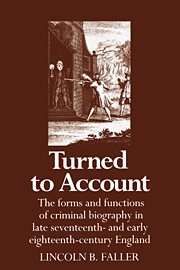 Turned to Account
Turned to Account Book contents
- Frontmatter
- Contents
- Preface
- Part I Turning criminals to account: three case histories and two myths of crime
- Part II Enucleating the truth: the criminal as sinner turned saint
- 3 In the absence of adequate causes: efforts at an etiology of crime
- 4 Heaven seized by sincerity and zeal: justifying God, vindicating man
- 5 Love makes all things easy: recementing the social bond
- Part III Palliating his crimes: the thief as various rogues
- Postscript: Criminal biography and the novel
- Appendix I Who read the popular literature of crime?
- Appendix II The politics of thieving
- Notes
- Select bibliography
- Index
5 - Love makes all things easy: recementing the social bond
Published online by Cambridge University Press: 05 February 2012
- Frontmatter
- Contents
- Preface
- Part I Turning criminals to account: three case histories and two myths of crime
- Part II Enucleating the truth: the criminal as sinner turned saint
- 3 In the absence of adequate causes: efforts at an etiology of crime
- 4 Heaven seized by sincerity and zeal: justifying God, vindicating man
- 5 Love makes all things easy: recementing the social bond
- Part III Palliating his crimes: the thief as various rogues
- Postscript: Criminal biography and the novel
- Appendix I Who read the popular literature of crime?
- Appendix II The politics of thieving
- Notes
- Select bibliography
- Index
Summary
As they could not spend their whole Time in Acts of Devotion, I thought they could not employ some intervals better, than in perfecting the Confessions which they had promis'd, which was a Satisfaction they ow'd their Country.
William Talbot, then bishop of Oxford, Truth of the Case (1708), p. 36That Man who should deprive another of his life … has … thereby shew'd his Malice and Enmity to the whole human Race.
Trial of Charles Drew (1740), pp. 34–35Murder is an unnatural sin: A man is a member of the Commonwealth, and so the murderer kills part of himself.
Heaven's Cry against Murder (1657), p. 15But let us suppose, for once, that Murther reach'd no further than the Man. … we should find it to be criminal enough for all considering Men to stand aghast at; because of that Injury which it offers to Humane Society, which is the Band and Cement of the World … : it doth … by its noxiousness beget a dissidency in Men towards each other. … what is it, but to bring in that State of War, which some, though fondly, have imagin'd to be the state of Nature?
Gabriel Towerson, An Exposition of the Catechism of the Church of England. Part II (1681), p. 330He reads by his example, a lecture of consolation.
R[obert Boreman], Mirrour of Mercy (1655), p. 30And yet we can but pity their untimely transmigrations from this lower World … considering they are our Fellow-Creatures.
Execution of 11 Prisoners (1679)- Type
- Chapter
- Information
- Turned to AccountThe Forms and Functions of Criminal Biography in Late Seventeenth- and Early Eighteenth-Century England, pp. 91 - 116Publisher: Cambridge University PressPrint publication year: 1987


